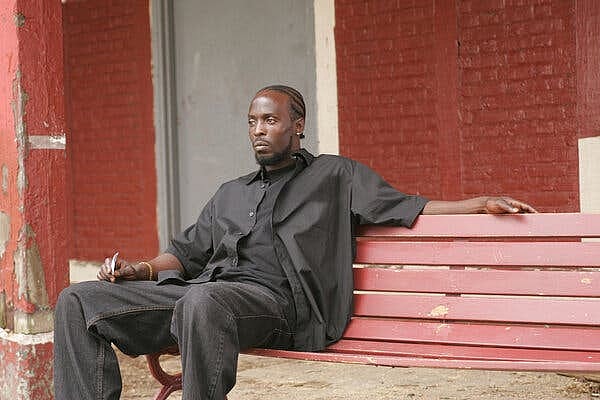Michael K. Williams was an actor of immense power and serious demons that he seemed to bring into some of his work. He gave life to one of the most unforgettable characters in TV history, Omar Little from The Wire, a killer who was unconnected to any gang, and the one man who struck fear in the hearts of everyone on the street. When he came strutting slowly up the block in his long coat and his tight braids people yelled, “O-mar comin!!!”
Then the d-boys scattered like roaches when the lights come on. He was like death incarnate, the monster who cannot be stopped, the problem that would never go away. But what really made Omar shocking and iconic is that he was openly gay at a time when that was uncommon on TV. When he wasn’t striking fear in the hearts of Baltimore’s drug soldiers, he was cuddled up with a pretty boy, stroking his hair, sucking his tongue, and professing his love. We had never seen a Black character of that duality on television — both tough and tender, homicidal and queer, boldly hood and blatantly homosexual. He redefined what straight people thought was possible from gay Black men and became a hero to many gay viewers for breaking boundaries.

I met Williams several times and interviewed him twice and he was not Hollywood, was not glitzy and polished. Many actors play a thuggish role and then show up to be interviewed looking so clean it was as if they’d been on a different planet when they shot the film. Not Williams. He was so rough and rugged it seemed like he would’ve been friends with Omar. He was street to the bone. He also seemed troubled. He had steely eyes that could pierce holes in you.
In one of our interviews I asked him about how he found Omar’s backstory and he snapped at me, yelling, “That’s for me to know!” He was cagey throughout our interview, refusing to talk deeply about his art — it was a subject he would not visit. That’s a shame because he was an extraordinary actor who was unforgettable in The Night Of, When They See Us, Boardwalk Empire, and more. It would’ve been helpful for younger actors to know more about how he approached his craft but he wasn’t talking.

Williams was more open with me in talking about his drug issues — he started smoking crack when he was 17 and struggled with an addiction to it most of his life. You never truly stop being an addict, you just hope to not use today. Williams got control of it then fell off the wagon while shooting The Wire. His long struggle with addiction may have informed his feelings about criminal justice reform, a cause that was very close to his heart. He spoke passionately and knowledgeably about the evils and biases of the police, the courts, the prisons.
In our first interview in 2017, he got emotional speaking about a beloved family member who was locked up, he seemed close to tearing up as he talked about him, and in our second interview in 2018 that family member was with him — he had been released just days before. Williams spoke with a preacher’s fire about how prison and the system had done this man wrong. He did not care about his fame except to use it to shine a light on this issue. I saw him at rallies and private events meant to raise awareness about prison reform. He was a committed warrior because it was personal for him. In his activism, as in his art, he brought a burning passion to the issue and he did things his way.

Touré is the host of the podcasts Toure Show and Democracyish and the podcast docuseries Who Was Prince? He is also the author of six books.
Have you subscribed to theGrio’s “Dear Culture” podcast? Download our newest episodes now!
TheGrio is now on Apple TV, Amazon Fire and Roku. Download theGrio.com today!


